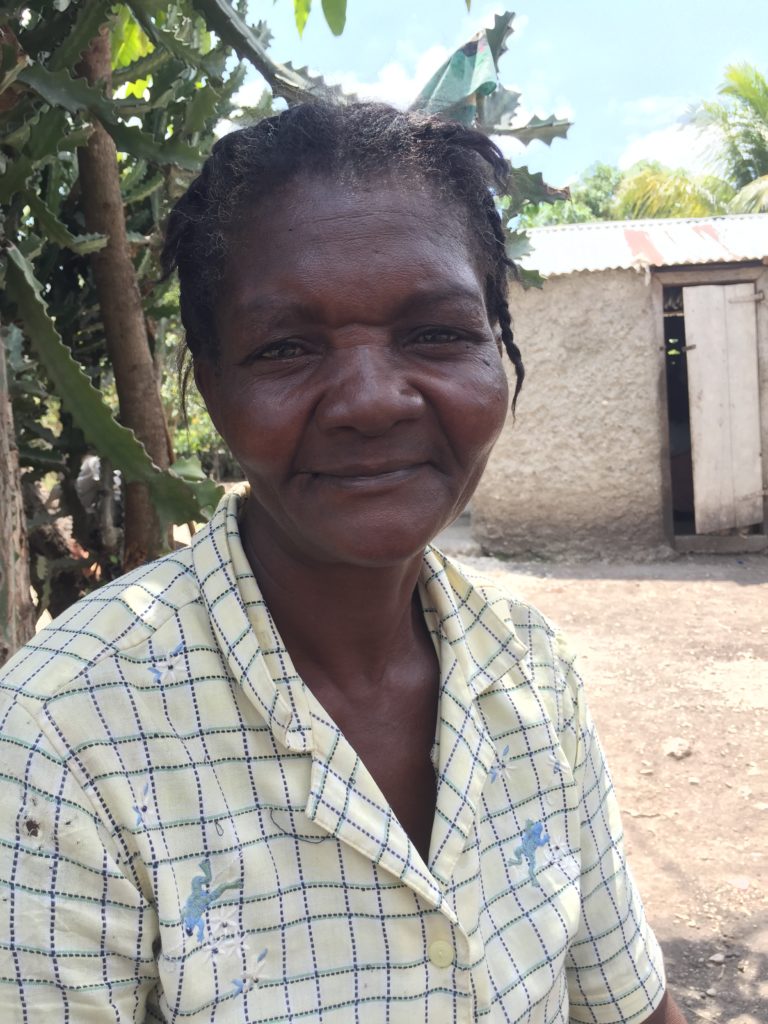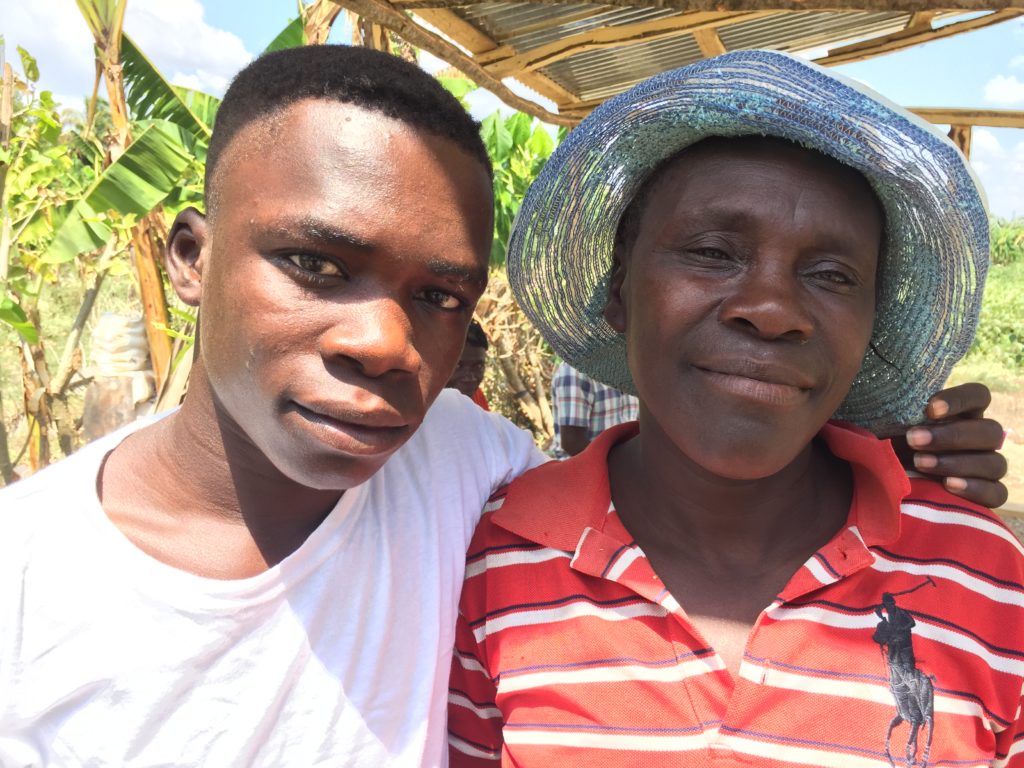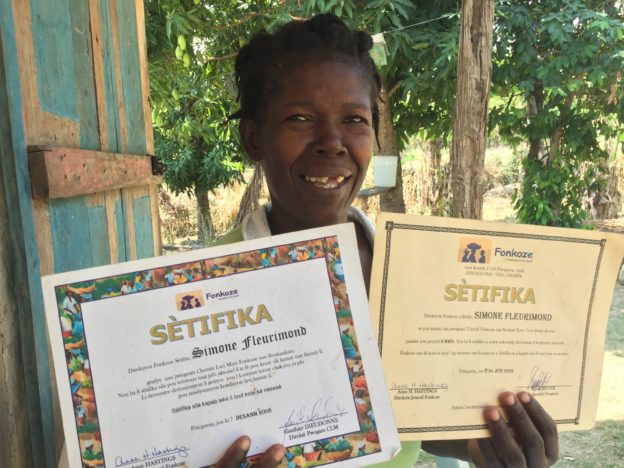Simone Fleurimond lives in Lachose, one of the many small neighborhoods that dot southern Boukankare as it stretches from the mountains of Tit Montayn, Mannwa, and Balandri towards the Artibonite River. She’s been there for a couple of years, since moving from Montas, the nearby corner where she lived when she joined the CLM program in 2007. She was part of the first cohort of CLM families, the ones who participated in Fonkoze’s pilot of the program. The cohort graduated in December 2008.
When she joined the program in 2007, her life was hard. “I had no one. I didn’t have a husband.” Her two girls were in school, nevertheless. She sent them by farming land she would rent. She would sell part of her harvest to earn the cash she needed, but it was a struggle to come up with the money to pay for school every year. “Sometimes we didn’t have food to eat.” She tried to get ahead by taking care of a pig for a neighbor. That would have earned her a piglet, which would have given her a start towards building up something of her own, but the pig died.
The program gave her goats and poultry to raise. She keeps goats even now, more than ten years later, and occasionally keeps chickens as well.
She graduated the program with her livestock, and transitioned into Fonkoze’s Ti Kredi program, an approach designed with more accompaniment and fewer barriers to participation to overcome than the institution’s standard credit programs, and she graduated from that program less than a year after graduating from CLM. She still carefully preserves both of the certificates that she earned.
Even before graduation, her life began to change in important ways. She took up with a man. She had been living on rented landed, and moved with him and her children to a plot that belongs to his family. That is where she now lives.
Then her daughters moved away. Her younger sister was living near the coast in Arkaye, and when she had twins she asked Simone for one daughter, Sheila. As a single mother, the sister needed a babysitter and promised to send Sheila to school. Sheila lived with her aunt and went to school for several years, helping take care of the twins.
Simone sent her other child to live in Mibalè, so that the girl would be able to attend better schools than she had access to in Lachose. The girl stays with a neighbor who has a house in town, but Simone still supports her, sending money, food, and cooking fuel to the household regularly.
Sheila recently had to return to her mother’s home. Her aunt died, and a neighbor took her in together with the aunt’s twins. Sheila had a good relationship with the woman, but the woman’s husband began to flirt with her. Sheila says things got worse and worse until he tried to force himself on her, so she had to leave.
Simone now is figuring when she will get Sheila into school and how she will pay for it. Until recently, she was managing most of her expenses with a business selling fried snacks at the intersection of dirt roads just in front of the cluster of homes where she lives, but the business depended on capital she borrows from a friend, and the friend needed her money back.
She is still part of Fonkoze’s loan programs. In fact, her latest loan was substantial, for 30,000 gourds. But she does not get to use that money. Her husband uses it to manage his business, a shop in the neighborhood that sells rum and crackers, mostly wholesale. Simone is getting increasingly frustrated with the arrangement. “I’m not really his wife. He has another woman. And he doesn’t really help me with his business. I’m going to leave him. He can take out his loans in someone else’s name. If I can just find a plot of land, I’ll manage to build a house. Then I just have to get Sheila back in school.”

Mariane Florvil was part of the same cohort. She entered the program as a widowed mother of four, supporting her children on her own. They were all living in one little straw shack.
She grew up with poverty similar to what she and her children were living with. She never knew her mother. The older woman had become pregnant immediately after giving birth to Mariane, and she died in childbirth. An aunt took Mariane in and raised her.
When part of the program, she established businesses raising goats and poultry. The poultry never worked out for her. CLM gave her local hens and a large, purebred rooster. But the hens died, and someone stole her rooster. But goat-rearing became an important part of her livelihood. She would have two or three females, and raise their kids, selling a few of the goats each year to send her children to school.
The regular need to sell one or two eventually took her to her limit. She sold her last goat this year to pay her children’s school fees. But she did it with a plan. She found a neighbor willing to let her take care of his goat. When the goat has a litter, she’ll be entitled to one as payment for her work, and that will help her get started again.
She did not use the goats to manage her day-to-day expenses. She did that through farming and small commerce. She would buy a rantor two of land. That’s the right to plant and harvest a plot of land for a single season. She still depends on her farming, planting okra as a cash crop. Normally, she can grow it in both wet and dry seasons near the river, and plants it in her own yard when there’s rain to water the plants. But the intense drought over the last year has hurt her badly. She says that the last rantshe purchased was a total loss. She plans to plant another crop when this year’s rains begin. She is making charcoal that she’ll sell to earn what she needs to invest.
She was also earning money selling cooking charcoal, buying it by the sack in the countryside and then transporting the sacks into town. But the work became impossible after she came down with shingles. The disease sapped her of much of her strength, and makes it painful for her to move around in the midday heat.
She still uses the one-room house she built while a member of the CLM program, but it is not where she lives. It is now her kitchen. Her oldest daughter is a tailor and she’s helping her mother build a nicer, larger house next door.

Marie Marthe Michel, too, was part of the CLM pilot in 2007 and 2008. She and her husband were raising their seven children.
She and her husband worked day labor when they could find it, and she would occasionally do small amounts of laundry for wealthier neighbors. They rented a small plot of land to farm. Sometimes they’d have nothing to live on except small gifts they would receive from friends. Though four of their children were in school, the family would often go a day or more without a meal.
Joining the CLM program, she says, made a big difference right away. “Life just wasn’t the same. They gave us a stipend at the start and livestock we could take care of.”
Marie Michel’s livestock – mainly goats – didn’t really take off. Now and then one would die. She found she couldn’t count on it as a source of income. But she also established a small commerce, selling groceries in the market and out of her home, like spices, bouillon cubes, oil, rice, and beans.
In 2009, her husband died. She sold out the rest of her livestock and all her business capital to pay for the funeral. She had to figure out how she would raise her children on her own.
But she was determined to succeed with them. “I always had hope. You can’t lose hope. You’re a woman.” She began to invest more time in her farming, but that hasn’t proven to be a good solution for her. “I’m getting older. I can’t keep working in the fields. I’m not strong enough.”
So, she borrowed 1000 gourds from a friend and started a small business. She makes and sells akasan, a Haitian beverage make from corn. It’s a popular street food, especially in the mornings. She sets up her stand directly across the river from the Nan Dal market, at one of the sites where the canoe-ferries load and unload.
Three of her children are still in school. The four older ones – kids in their late teens and 20s – stopped so that their mother could focus on the other three, and they are moving forward. Delikson is in Haiti school now. “I want him to finish and learn a profession. He wants to study agronomy.”

I am a former teacher and a friend and an admirer of Steven Werlin. But I also admire everyone associated with the work you do. For you lead admirable lives. Please remind me of how I may contribute some money to Fonkoze.